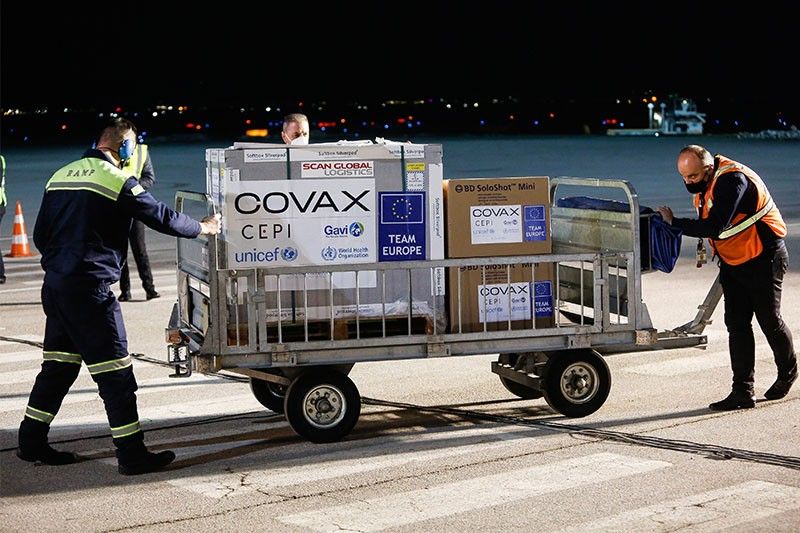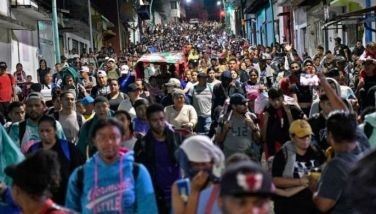UN chief criticizes wealthy countries for vaccine 'stockpile'

MONTREAL, Canada — UN Secretary-General Antonio Guterres criticized developed countries for creating a "stockpile" of Covid-19 vaccines, and called on them to share with the rest of the world to help end the pandemic.
"I'm very concerned with this very unfair distribution of vaccines in the world," Guterres said in an interview broadcast Sunday by the Canadian channel CBC.
"It's in the interest of everybody to make sure that as soon as possible and in a fair way, everybody gets vaccinated everywhere and that vaccines are considered to be a truly global public good," he said.
The UN chief criticized the "self interest" of rich countries for building up vaccine supplies beyond the needs of their populations.
"First, don't stockpile vaccines," he said, adding that it "doesn't make sense."
"We have been appealing to developed countries to share some of the vaccines that they have bought and in many situations they have bought more than what they need."
The secretary-general lamented that the Covax international system of vaccine aid to disadvantaged countries is having "difficulties" because "there's been a lot of hoarding."
He said that ending the pandemic "depends a lot on having the possibility to vaccinate as quickly as possible the population all over the world," and he pleaded in favor of a mechanism powered by the G20 to put in place a global vaccination plan.
Asked about the possible adoption of vaccination passports, Guterres was cautious, saying that before any decision is taken, there must be serious discussion to ensure fairness and to make sure that there is effective global cooperation.
"The worst is for some countries to have it and for other countries not have it... it will be devastating if this would mean that people could move within the developed world but not within the developing world," he warned.
Pharma giants Sanofi and GSK said on July 29, 2020, that they have agreed to supply Britain with up to 60 million doses of a potential COVID-19 vaccine. The agreement covers a vaccine candidate developed by France's Sanofi in partnership with the UK's GSK and is subject to a "final contract."
This thread collects some of the major developments in the search for a vaccine to ease the new coronavirus pandemic. (Main photo by AFP/Joel Saget)
As negotiations towards a new pandemic treaty pick up pace, observers warn of watered-down efforts to ensure equitable access to the medical products needed to battle future Covid-like threats.
Shaken by the pandemic, the World Health Organization's 194 member states are negotiating an international accord aimed at ensuring countries are better equipped to deal with the next catastrophe, or even prevent it altogether.
The process is still in the early stages, with the aim of reaching an agreement by May 2024.
But critics warn that revisions being made to the preliminary negotiating text are weakening the language -- notably in a key area aimed at preventing the rampant inequity seen in access to vaccines and other medical products during the Covid pandemic.
"I think it is a real step backwards," Suerie Moon, co-director of the Global Health Centre at the Geneva Graduate Institute, told AFP. — AFP
Africa's first mRNA vaccine hub is ceremonially launched on Thursday to acclaim from the UN's global health chief, who hailed it as a historic shift to help poor countries gain access to life-saving jabs.
The facility was set up in the South African city of Cape Town in 2021 on the back of the success of revolutionary anti-Covid vaccines introduced by Pfizer/BioNTech and Moderna.
"This precious project... will bring a paradigm shift in addressing the serious problem we faced, the equity problem, during the pandemic, so (that) it's not repeated again," World Health Organization (WHO) head Tedros Adhanom Ghebreyesus tells a media briefing to mark the inauguration. — AFP
China has approved its first locally developed messenger RNA (mRNA) vaccine against Covid-19, its manufacturer said Wednesday, months after the relaxation of strict Covid-zero regulations sparked a surge in cases.
The vaccine, developed by CSPC Pharmaceutical Group Ltd, has been approved for "emergency use" by Beijing's health regulator, the company said in a statement.
It showed high efficacy in a trial in which it was used as a booster shot for people who have been given other types of vaccines, the company added, without offering further details. — AFP
COVID-19 vaccine maker Novavax raises doubts about its ability to continue its business, announcing plans to cut spending after struggles in rolling out its coronavirus jab.
Shares of Novavax plummeted 25 percent in extended trading, after the company reported fourth-quarter earnings that missed analyst estimates.
While the firm should have enough money to fund operations, the situation is "subject to significant uncertainty," it says in a statement. — AFP
The protection against Covid-19 from being previously infected lasts at least as long as that offered by vaccination, one of the largest studies conducted on the subject says.
Ten months after getting Covid, people still had an 88% lower risk of reinfection, hospitalisation and death, according to the study published in the Lancet journal.
That makes this natural immunity "at least as durable, if not more so" than two doses of Pfizer or Moderna's vaccines, the study says.
The authors nevertheless emphasized that their findings should not discourage vaccination, which remains the safest way to get immunity. — AFP
- Latest
- Trending

































